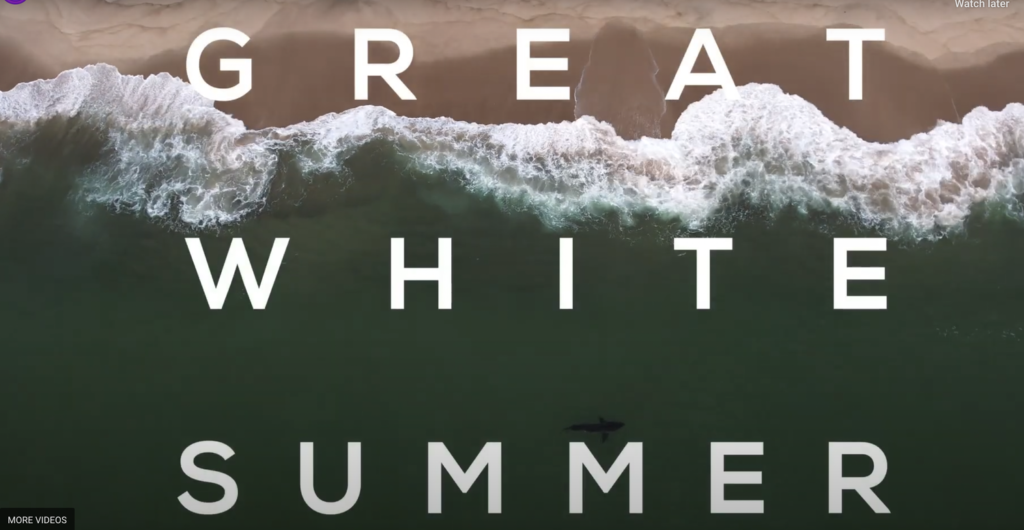Table of Contents

Introduction – Great White Summer.
*Great White Summer* looks to be a compelling examination of the conflicts that occur when the natural world and human existence intersect. Focusing on the aftermath of the first deadly shark attack in eight decades, the documentary shows how an otherwise tranquil village descends into anarchy. The filmmaker, Nick Budabin, delves into the terror and survival instincts that develop from living with growing shark populations, capturing the intricacies of this coexistence. The documentary offers both a sobering story and a provocative look at how humans and nature must coexist, reflecting on the larger environmental challenges that lead to the rising presence of sharks.
Plot Summary
Set against the serene and picturesque landscape of Cape Cod, Great White Summer begins with a shocking and rare tragedy—a fatal shark attack that sends shockwaves through the close-knit community. The documentary masterfully captures the immediate aftermath, as panic grips residents and visitors alike. The peaceful surf town, once synonymous with relaxation and leisure, is now at the center of a growing crisis. As shark encounters become more frequent, the film explores how the community grapples with fear and the urgent need for action. What unfolds is a struggle between the primal instinct for survival and the values of unity, conservation, and coexistence.
Director Nick Budabin’s Vision
Renowned for his painstaking approach to filmmaking and vivid storytelling, Nick Budabin offers *Great White Summer* a captivating vision. His direction immerses viewers in the center of the shark problem as it unfolds by combining breathtaking, immersive images with a deep emotional depth.
The sense of unease and unpredictability that permeates the Cape Cod community is expertly captured by Budabin, giving the issue a personal and pressing sense. Beyond simple documentation, his examination of issues like terror, survival, and the precarious balance between humans and environment offers a compelling, thought-provoking tale that lingers long after the movie finishes.
The Shark Crisis Unveiled
The central theme of *Great White Summer* is the rise in shark populations, as the movie delves deeply into the ecological and environmental elements behind this growth. The number of great white sharks off the coast of New England is increasing due to factors like rising temperatures, conservation efforts, and changes in marine habitats.
Increased hazards accompany this surge as local businesses and residents deal with hitherto unseen obstacles. The film looks at how this natural occurrence affects daily life, causing uncertainty, dread, and financial pressure for the Cape Cod population. It includes beach closures and a notable drop in visitors.
Community and Culture Clash
The effects of the shark issue on the once-thriving surfing culture and economy of Cape Cod are depicted clearly in *Great White Summer*. Surfers now confront genuine danger with every trip into the sea; earlier they found comfort and delight in the waves. The emotional toll that fear takes on freedom in the surfing community is shown in the film. The consequences are dire from an economic standpoint: when beachgoers and tourists avoid the area, local companies that depend on tourism suffer.
The documentary puts humanity front and center by presenting the unique challenges and tenacity of people coping with the unpredictability and instability brought on by this environmental catastrophe via personal tales.
The Role of Scientists
In the middle of the chaos, *Great White Summer* highlights the vital role that scientists play in trying to comprehend the habits and quickly expanding shark population. The difficulties these researchers have are emphasized in the movie, from obtaining data in erratic circumstances to informing the public of their results.
Their research sheds insight on the difficulties associated with shark conservation, demonstrating that while preserving ecological balance and public safety are top priorities, safeguarding these apex predators is also essential. Offering a nuanced viewpoint on a contentious topic, the movie explores the difficult task of striking a balance between the need for responsible environmental management and fear.

Media and Public Perception
In *Great White Summer*, media attention shows itself as a potent factor in influencing how the general public views the shark attacks. The movie explores how sensationalist news exaggerates worry by elevating small-scale incidents into national spotlights that exacerbate concern both within and outside of the community. This narrative of dread shapes governmental decisions about beach safety and shark management on a larger scale in addition to local responses.
The documentary explores how the media’s depiction of the problem can distort shark behavior in real life through interviews and analysis, which can have an impact on local initiatives and the general strategy for coexisting with these marine predators.
Nature vs. Commerce
Following the shark attacks, *Great White Summer* deftly examines the complex conflict between conservation and trade. While local companies struggle with the financial consequences, the video poses important queries about putting business interests before of environmental preservation.
The movie compares Cape Cod’s predicament to that of other areas dealing with comparable issues, offering a thorough understanding of how people manage the tightrope between preserving their way of life and protecting the natural ecosystems. *Great White Summer* emphasizes the critical need for a cooperative strategy that takes into account both economic sustainability and the protection of marine life through interviews with business owners, conservationists, and community members. It does this by highlighting the intricate relationship between environmental stewardship and human activity.
Personal Allegiances and Suspicion
*Great White Summer* does a good job of capturing the escalating tension and dread in the neighborhood as well as the changes in personal loyalties. As locals begin to doubt the intentions of both local officials and one another on how the shark crisis is being handled, trust becomes more scarce.
The documentary reveals the intricacies of human behavior during times of crisis by illuminating how connections crack under the weight of a shared peril through compelling storytelling and firsthand testimonials. As priorities change and allegiances are put to the test, people who previously stood together against the ocean’s waves suddenly find themselves separated. The story gains depth from this complex depiction of community dynamics, which also emphasizes the emotional cost of the events and how relationships may become brittle and insecure even in the midst of danger.
Survival and Adaptation
One of the main themes of *Great White Summer* is the inhabitants’ tenacity. The movie eloquently depicts the several approaches that locals take to deal with the uncomfortable fact of an increase in shark encounters. Viewers observe how locals put safety precautions in place, such increased beach patrols and public awareness campaigns, to safeguard themselves and their loved ones through interviews and personal accounts. The documentary also shows how daily routines are changing, with families modifying their beach visits and surfers taking new safety measures before hitting the waves.
The ability of the community to adapt and flourish in the face of hardship is demonstrated by their combined resolve. The film serves as a reminder to viewers that resilience can shine brightly even in the face of fear and uncertainty by capturing not only the difficulties brought about by the shark issue but also the enduring resolve of the people who call Cape Cod home.
Cultural Reflections
*Great White Summer* explores the historical and cultural elements that influence the community’s reaction to the shark threat, offering a moving meditation on New England culture. The movie looks at how impressions of these fearsome monsters are shaped by decades of maritime tradition and local lore. Long-term residents’ memories and ingrained beliefs are revealed through interviews, adding to the nuanced interaction between the town and sharks.
The documentary also looks at how sharks have shaped local culture and identity on a larger cultural scale, emphasizing how they are both symbols of wonder and dread. This cultural perspective gives the story more dimension by showing how the shark threat affects the community and sparks conversations about environmental preservation, safety, and New England’s rich maritime history. By combining these issues, *Great White Summer* asks viewers to consider the cultural myths that influence how we perceive the natural world in addition to documenting a current crisis.
The Film’s Impact and Reception
*Great White Summer* has garnered significant praise from reviewers and viewers alike due to its engaging narrative and didactic methodology. Critics have praised the movie for its skill in fusing factual facts with dramatic storylines to create a compelling and interesting visual experience. While being emotionally engrossed in the individual tales of those impacted, the film strikes a mix between suspense and knowledge, enabling audiences to comprehend the complex dynamics of the shark epidemic.
The impact and resonance of the documentary have been acknowledged by multiple nominations and awards, which further demonstrates its success. Reviewers have given filmmaker Nick Budabin high marks for his perceptive depiction of the community’s hardships and resiliency, which highlights the film’s applicability in conversations concerning public safety, conservation, and the cultural value of sharks. *Great White Summer* is a tribute to the ability of documentary filmmaking to confront pressing environmental issues while shedding light on the human tales at their heart, as it continues to attract audiences.
The Broader Implications
*Great White Summer* examines the long-term effects on shark conservation and the future of surfing in New England, going beyond the immediate events of the shark crisis. The movie poses important queries on how societies might live in harmony with these apex predators while maintaining public safety. It looks at the fine line that must be drawn between safeguarding tourism-dependent local economies and promoting a healthy shark habitat.
The documentary also offers a worldwide viewpoint by contrasting the ways in which different parts of the world handle shark attacks and conservation initiatives. Through the presentation of various strategies—from community education to proactive safety measures—the film emphasizes the significance of cooperative tactics in reducing the hazards linked to growing shark populations.
In doing so, *Great White Summer* underscores the need of cultivating a cultural awareness of sharks, which can help lessen fear and promote cohabitation, in addition to highlighting the critical need for comprehensive conservation policies. In the end, the movie is a call to action for viewers to think about how they might safeguard marine ecosystems while navigating the challenging realities of coexisting with some of nature’s most ferocious species.
Where to Watch
On September 3, 2024, *Great White Summer* made its premiere. It can currently be streamed on a number of digital platforms. Those interested in learning more about the relationship between fear, the environment, and community have found this documentary to be quite captivating. The official website offers a multitude of material, including information on where to watch the movie, for people who are interested in delving deeper into the topics and content of the picture. You can also discover never-before-seen behind-the-scenes footage, expert and filmmaker interviews, and insider information about the documentary’s creation.
The movie’s social media pages are an excellent source of information as well, providing updates, forums, and interactive material that lets viewers connect with the problems the movie raises. Viewers may keep up with future screenings, special events, and any connected projects that may emerge from this influential documentary by subscribing to these channels. *Great White Summer* is a film that should appeal to anyone who like nature documentaries, surfing, or conservation. It offers an insightful look at the difficulties that coastal communities face during a shark crisis. Do not pass up the chance to immerse yourself in this moving story that explores the nuances of how people interact with the natural world.

Conclusion
*Great White Summer* is an engrossing and provocative examination of a community in the wake of an uncommon but devastating shark attack. The film explores the intricate relationship between nature, culture, and the survival instinct of humans through its compelling storyline and careful analysis of the events leading up to the crisis. As the story progresses, it portrays the people’s varied responses and unfiltered feelings, highlighting their fortitude in the face of uncertainty and anxiety. The story delves deeply into the wider ramifications for the community, encompassing the influence on local enterprises, tourism, and the surfing culture that characterizes Cape Cod, in addition to concentrating on the immediate aftermath of the attack.
Moreover, *Great White Summer* is a moving meditation on the challenges of living with nature. It brings up important issues related to public safety, conservation, and striking a balance between environmental preservation and community well-being. Viewers will have a clearer grasp of the nuances of human-nature relationships as the video highlights the struggles and victories of living in harmony with the natural environment while following the locals through this difficult summer.
Do follow us on https://talkieflix.com


Главная https://bs2beast.cc/
https://www.houstoniamag.xyz/style-and-shopping/small-local-shops-houston
Daftar Beberapa Harga Borak
If You Want Paid Guest Or sponsored Post On My WebSite Then You Can Contact Us On My Email :-rajuthakur.2325@gmail.com
selamat datang di situs slot terbaik, https://ojs.uninus.ac.id/api/ daftar
If You Want Paid Guest Or sponsored Post On My WebSite Then You Can Contact Us On My Email :-rajuthakur.2325@gmail.com
Üsküdar kameralı tıkanıklık açma Üsküdar’da lavabo tıkanıklığı yaşadığımızda, bu firma ile iletişime geçtik ve hızlıca bir çözüm buldular. Ekip, sorunumuzu anında ele aldı ve hızlı bir şekilde müdahale etti. Memnuniyetimizi dile getirmek istedik! https://cittaviva.net/read-blog/625
Все актуальные предложения для новых игроков ждут вас на https://888starz.toda
Technoob Very well presented. Every quote was awesome and thanks for sharing the content. Keep sharing and keep motivating others.
dodb buzz Pretty! This has been a really wonderful post. Many thanks for providing these details.
Touch to Unlock Awesome! Its genuinely remarkable post, I have got much clear idea regarding from this post . Touch to Unlock
certainly like your website but you need to take a look at the spelling on quite a few of your posts Many of them are rife with spelling problems and I find it very troublesome to inform the reality nevertheless I will definitely come back again
thanks for your Valuable advice.
Mountsinai This was beautiful Admin. Thank you for your reflections.
Mountsinai I’m often to blogging and i really appreciate your content. The article has actually peaks my interest. I’m going to bookmark your web site and maintain checking for brand spanking new information.
Blue Techker very informative articles or reviews at this time.
Ive read several just right stuff here Certainly price bookmarking for revisiting I wonder how a lot effort you place to create this kind of great informative website
thanks for support…..